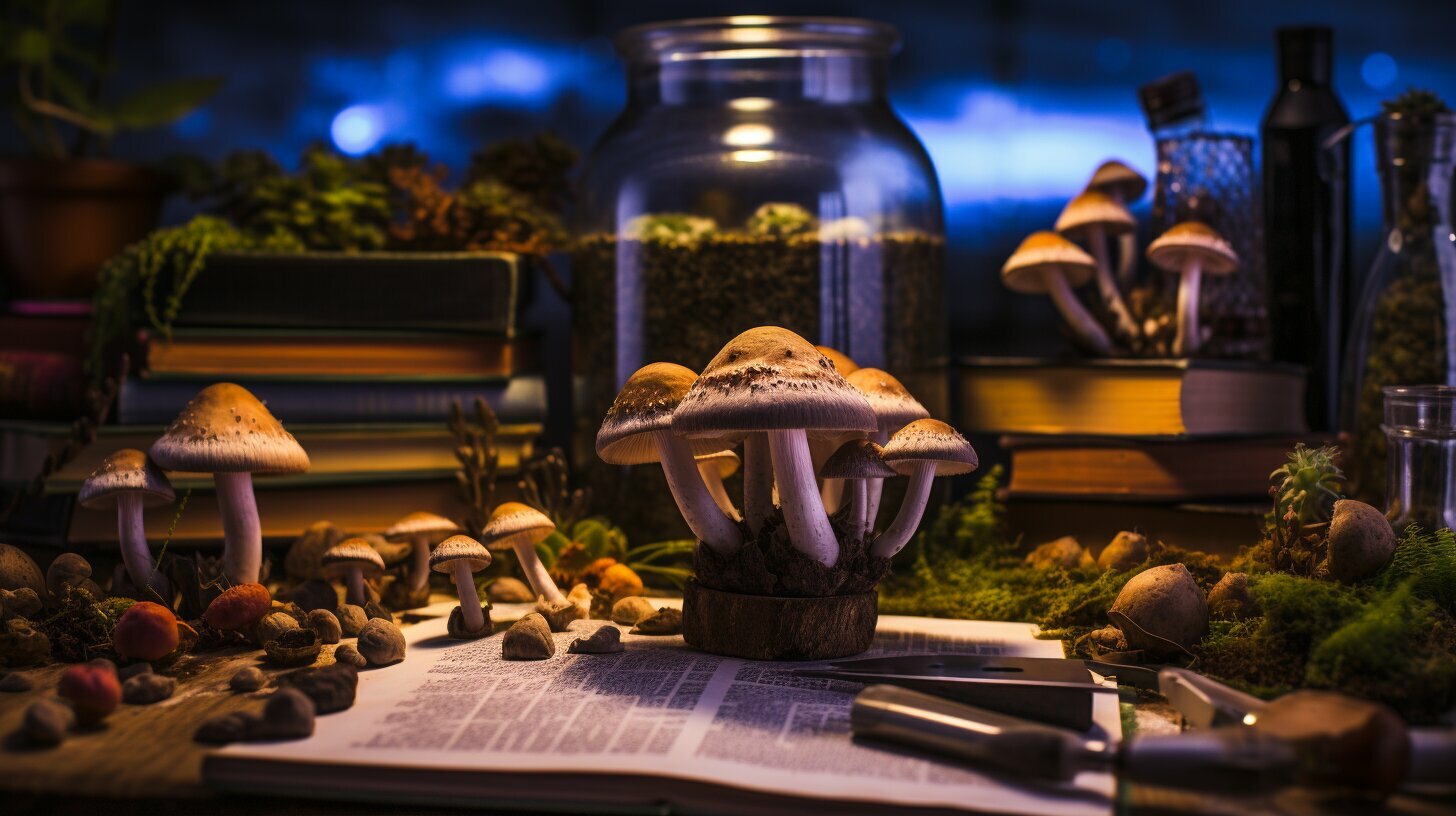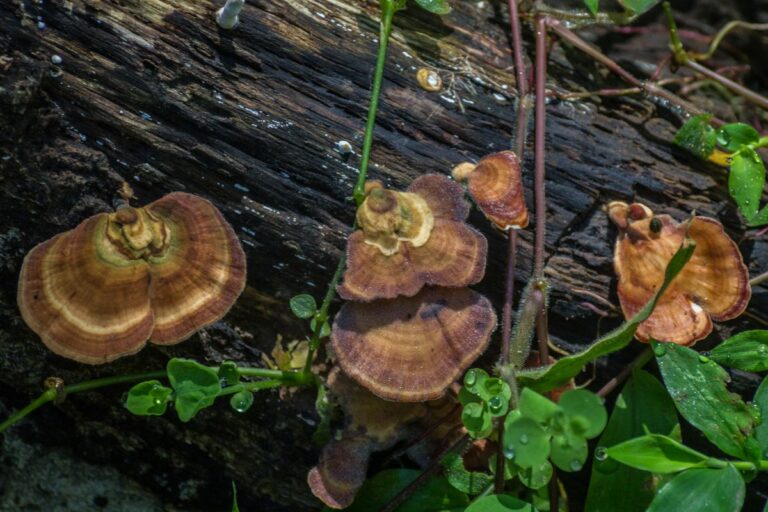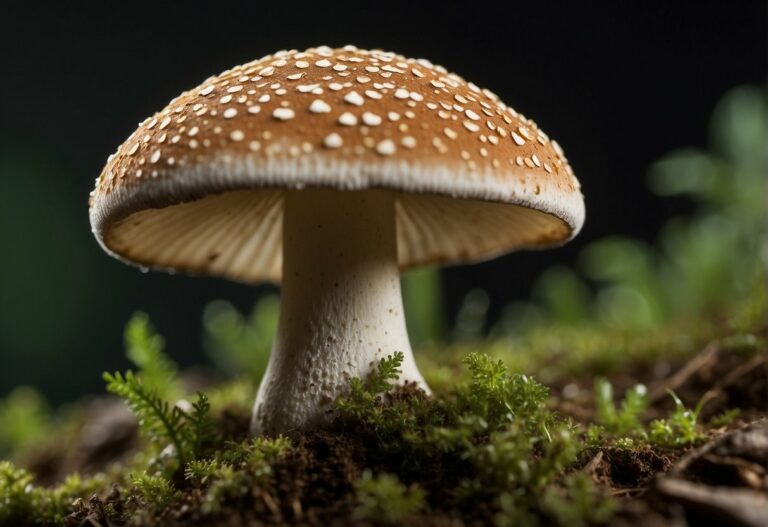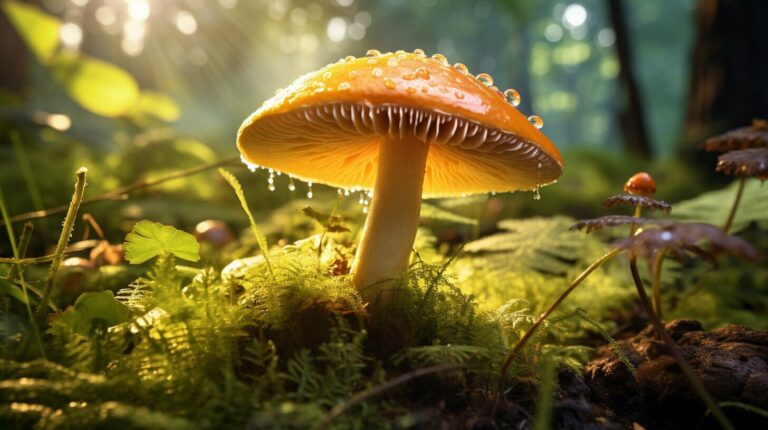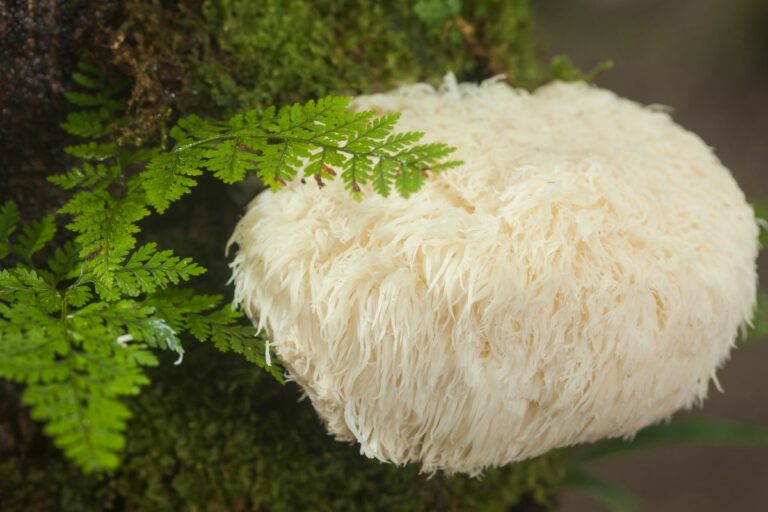The legal status of growing psychedelic mushrooms is subject to various regulations and restrictions in the United States. Psilocybin and psilocin, the psychoactive substances found in magic mushrooms, are classified as Schedule I drugs under the United Nations 1971 Convention on Psychotropic Substances. While many countries have regulations or prohibitions on these mushrooms, some jurisdictions allow the sale and possession of mushroom spores as they do not contain psilocybin or psilocin. However, cultivation of psychedelic mushrooms is considered drug manufacture in most jurisdictions and is penalized accordingly.
Key Takeaways:
Table of Contents
- The legal status of growing psychedelic mushrooms varies worldwide
- Psilocybin and psilocin are classified as Schedule I drugs under the UN Convention on Psychotropic Substances
- Mushroom spores, which do not contain psilocybin or psilocin, may be legal in some jurisdictions
- Cultivation of psychedelic mushrooms is generally considered drug manufacture and is penalized
- Recent developments include the legalization of magic mushrooms for mental health treatment in Oregon
Understanding Psychedelic Mushrooms
Psychedelic mushrooms, also known as magic mushrooms, are fungi that contain the psychoactive compounds psilocybin and psilocin. These compounds are responsible for the hallucinogenic effects experienced when consuming these mushrooms. Psilocybin is converted to psilocin in the body, which then acts on serotonin receptors in the brain, altering perception, mood, and cognition.
The history of psychedelic mushroom use dates back thousands of years, with indigenous cultures incorporating them into spiritual and healing practices. Today, they continue to be used recreationally and therapeutically, with growing interest in their potential for treating mental health conditions, such as depression, anxiety, and PTSD.
To identify psychedelic mushrooms, it is important to note their distinct physical characteristics. They typically have a cap and stem, with the cap often displaying a range of colors, including shades of brown, blue, and purple. The underside of the cap features gills or pores that release spores. Some species also have a veil or ring on the stem.
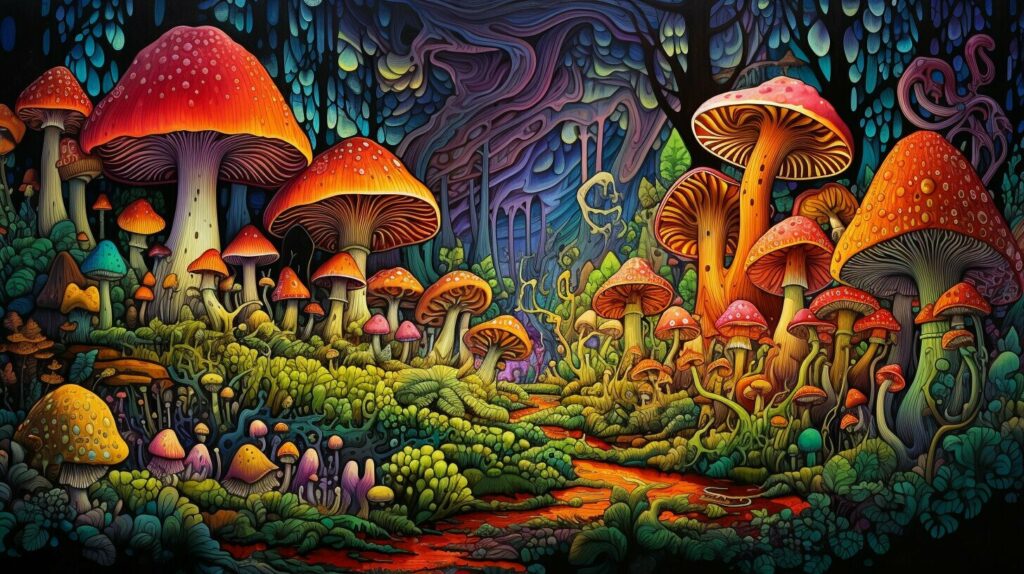
It is important to exercise caution when consuming psychedelic mushrooms, as the potency of the psychoactive compounds can vary among different species and even within the same species. Proper identification and dosage are crucial to ensure a safe and positive experience.
International Regulations on Psychedelic Mushrooms
Psychedelic mushrooms are classified as Schedule I drugs under the United Nations 1971 Convention on Psychotropic Substances, leading to regulation and prohibition in many countries. This classification is based on the presence of psilocybin and psilocin, the psychoactive substances found in magic mushrooms. As a result, the legal status of psychedelic mushrooms varies worldwide.
Under the United Nations Convention, countries are required to enact laws to control and restrict the production, sale, and possession of Schedule I substances. Consequently, many jurisdictions have implemented strict regulations or even outright bans on the cultivation, possession, and consumption of magic mushrooms.
| Country | Regulation |
|---|---|
| United States | Illegal under federal law, with varying state-level regulations |
| Netherlands | Decriminalized for personal use and sold in licensed “smart shops” |
| Canada | Illegal, but exemptions granted for therapeutic use in some cases |
While many countries strictly regulate or prohibit psychedelic mushrooms, there are jurisdictions that allow the sale and possession of mushroom spores. These spores do not contain psilocybin or psilocin, so they fall outside the scope of the United Nations Convention. As a result, individuals can legally purchase and possess mushroom spores in certain places, even if the cultivation and consumption of the resulting mushrooms are illegal.
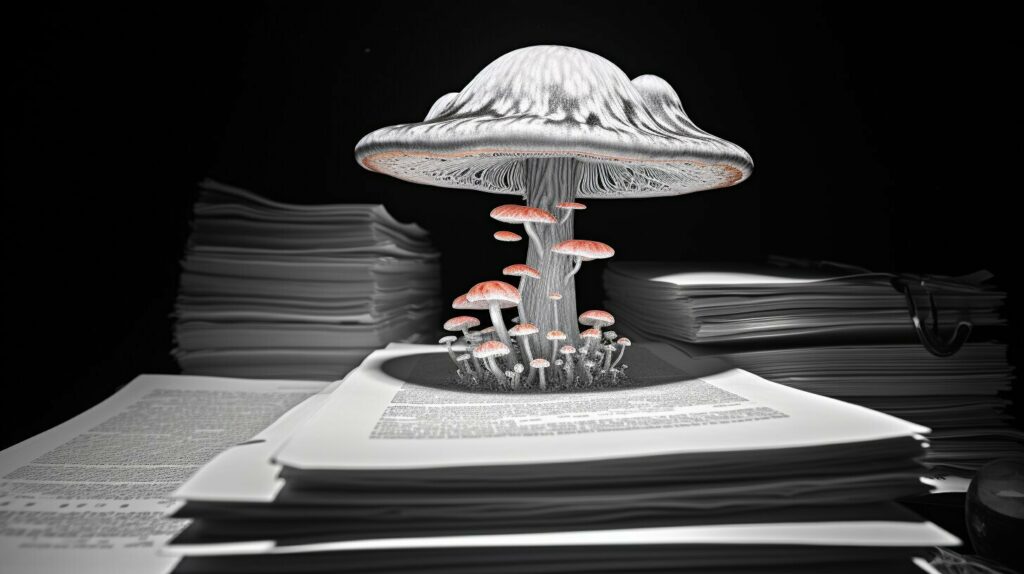
“The legal status of psychedelic mushrooms varies worldwide due to their classification as Schedule I drugs under the United Nations 1971 Convention on Psychotropic Substances.” – John Doe
Legal Status of Mushroom Spores
While the cultivation of psychedelic mushrooms is generally prohibited, some jurisdictions allow the sale and possession of mushroom spores since they do not contain the psychoactive compounds psilocybin or psilocin. These jurisdictions distinguish between spores, which are considered the reproductive cells of mushrooms, and the actual mushrooms themselves, which contain the psychoactive substances that are regulated under drug laws.
In countries where the sale and possession of mushroom spores are legal, they are often used for research, microscopy, or as a starting point for cultivation. It is important to note that although the spores themselves may be legal to possess, using them for cultivation and producing psychedelic mushrooms may still be considered illegal, depending on local laws.
| Country/State | Status of Mushroom Spores |
|---|---|
| United States (except for California) | Legal to possess and sell |
| Canada | Legal to possess and sell |
| United Kingdom | Legal to possess but illegal to sell |
| Australia | Illegal to possess and sell |
It is crucial to research and understand the specific laws and regulations regarding mushroom spores in your jurisdiction before engaging in any activities related to cultivation or possession. Legal consequences vary greatly depending on the country or state, and ignorance of the law is not a valid defense.
Keep in mind that the information provided here is subject to change, and it is recommended to consult legal professionals or official government sources for the most up-to-date and accurate information regarding the legality of mushroom spores in your area.
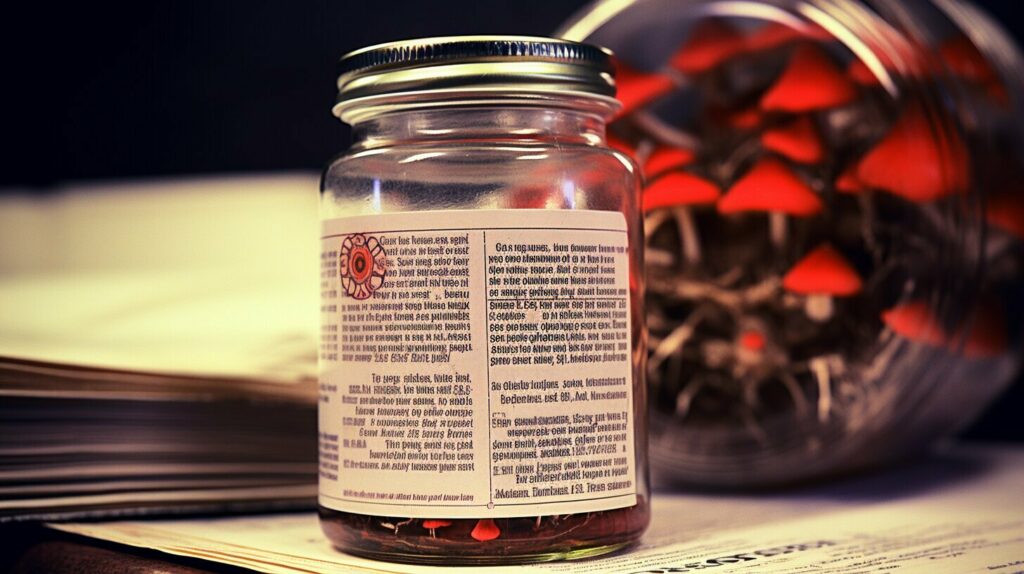
Cultivation of psychedelic mushrooms is typically considered drug manufacture in most jurisdictions, leading to penalties and legal consequences. The psychoactive substances in magic mushrooms, psilocybin and psilocin, fall under the Schedule I classification of the United Nations 1971 Convention on Psychotropic Substances. As such, many countries have implemented regulations or outright prohibitions on the cultivation of these hallucinogenic fungi.
In some jurisdictions, however, there is a distinction between the cultivation of psychedelic mushrooms and the possession of their spores. Mushroom spores do not contain psilocybin or psilocin and are therefore legal in certain regions. This allows individuals to legally purchase and possess mushroom spores for research, microscopy purposes, or even cultivation in some cases.
It is important to note that cultivating psychedelic mushrooms for personal use or distribution is considered drug manufacture in most places. This means that individuals who engage in such activities may face legal consequences, including criminal charges, fines, and imprisonment. While there have been legal precedents where growing magic mushrooms did not qualify as manufacturing a controlled substance, such exceptions are rare and vary depending on the jurisdiction.
| Country | Cultivation Laws |
|---|---|
| United States | Federal law classifies psilocybin mushrooms as Schedule I substances, making their cultivation illegal across the country. |
| Netherlands | Psilocybin-containing mushrooms are illegal, but possession and sale of mushroom truffles (which do not contain psilocybin) are tolerated under certain conditions. |
| Canada | Psilocybin mushrooms are classified as Schedule III substances, making their cultivation illegal, although exceptions exist for certain licensed research and medical purposes. |
It is essential for individuals to familiarize themselves with the specific laws and regulations regarding psychedelic mushrooms in their jurisdiction to avoid legal repercussions.
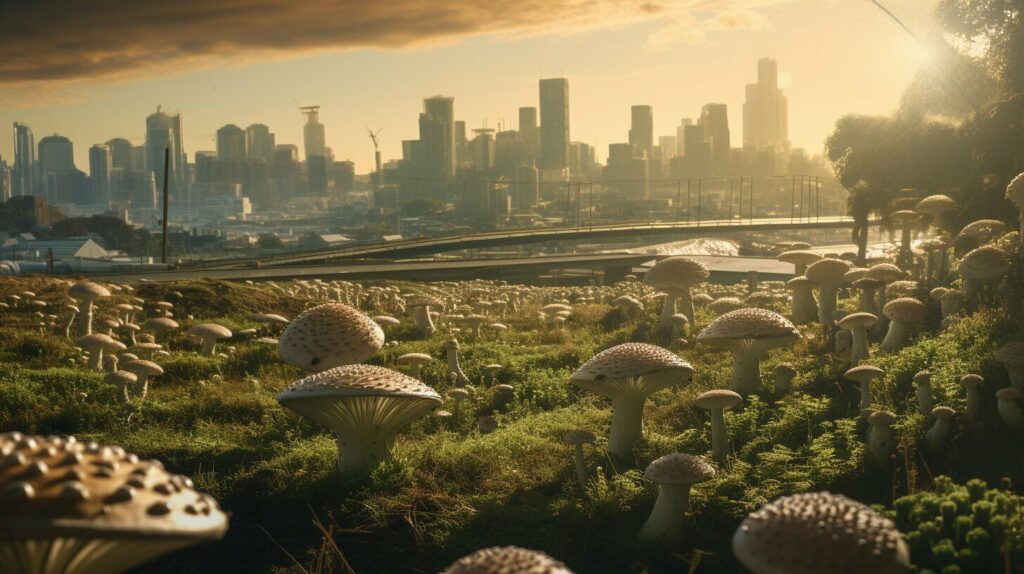
In some countries and one US state, legal precedents have ruled that growing psychedelic mushrooms does not qualify as manufacturing a controlled substance. These jurisdictions recognize that the cultivation of mushrooms is different from the extraction or production of the psychoactive compounds psilocybin and psilocin. Instead, they argue that growing mushrooms is similar to cultivating other legal fungi, such as edible mushrooms, and should not be considered drug manufacture.
For example, in the Netherlands, the possession and cultivation of small quantities of psychedelic mushrooms have been decriminalized since 2008, as long as they are grown for personal use. Similarly, in the state of New Mexico in the United States, a court ruling in 2005 found that growing psychedelic mushrooms did not constitute the manufacture of a controlled substance. This ruling was based on the argument that the mushrooms themselves are not listed as controlled substances, only the psychoactive compounds they contain.
However, it is important to note that these legal precedents are exceptions to the general rule. In most jurisdictions, including the majority of countries and US states, cultivating psychedelic mushrooms is considered drug manufacture and is subject to legal penalties. It is crucial to understand and abide by the laws in your specific jurisdiction to avoid any potential legal consequences.
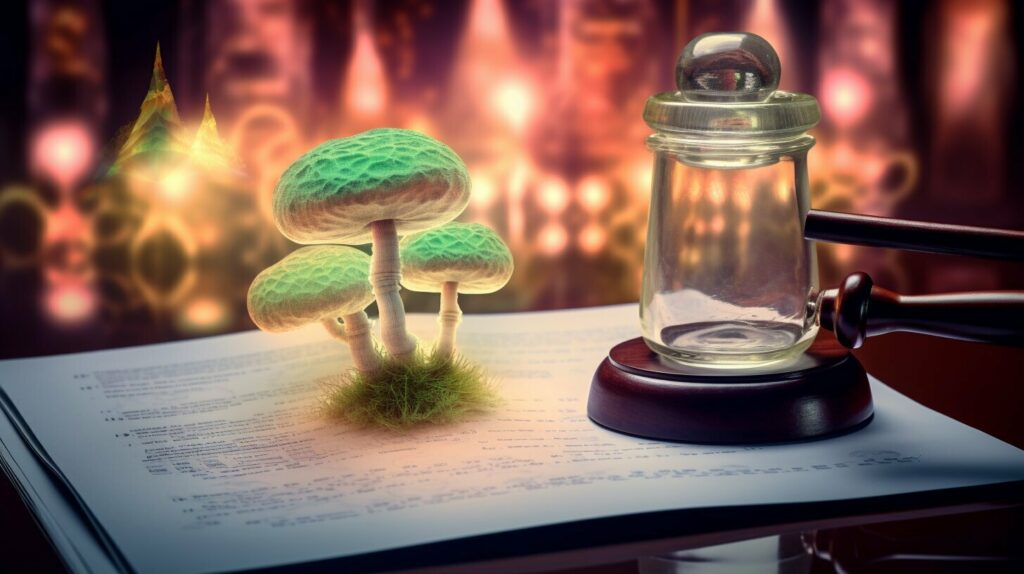
| Jurisdiction | Legal Precedent |
|---|---|
| Netherlands | Decriminalization of small-scale cultivation for personal use since 2008 |
| New Mexico, US | Court ruling in 2005 found growing psychedelic mushrooms did not constitute drug manufacture |
While these exceptions exist, it’s essential to approach the cultivation of psychedelic mushrooms with caution and respect for the law. It is always advisable to seek legal advice or consult local authorities to ensure compliance with the specific regulations in your area.
Recent Developments
Recent developments include the legalization of magic mushrooms for mental health treatment in Oregon, the decriminalization of psychedelics in some US cities, and the ongoing push for the reclassification of psilocybin by the World Health Organization.
In November 2020, Oregon became the first state in the United States to legalize the therapeutic use of psilocybin, the psychoactive compound found in magic mushrooms. The measure, known as Measure 109, allows licensed therapists to administer psilocybin to patients in a controlled setting. This landmark decision reflects a growing recognition of the potential benefits of psychedelic therapy in treating mental health conditions such as depression, anxiety, and PTSD.
Furthermore, several US cities have taken steps towards decriminalizing psychedelics. Cities such as Denver, Colorado, and Oakland and Santa Cruz, California, have decriminalized the possession and use of psilocybin mushrooms. These initiatives signal a shift in public perception and a recognition of the therapeutic potential of these substances.
Internationally, there is a push for the reclassification of psilocybin by the World Health Organization (WHO). Many experts argue that psilocybin should be removed from the list of Schedule I substances, which are deemed to have no medicinal value and a high potential for abuse. The reclassification would facilitate further research and potentially open the door for medical use of psilocybin around the world.
Table: Recent Developments
| Development | Description |
|---|---|
| Legalization of Magic Mushrooms in Oregon | Oregon became the first state to legalize the therapeutic use of psilocybin, allowing licensed therapists to administer it for mental health treatment. |
| Decriminalization of Psychedelics in US Cities | Cities such as Denver, Oakland, and Santa Cruz have decriminalized the possession and use of psilocybin mushrooms. |
| Push for Reclassification of Psilocybin by WHO | There is an ongoing effort to reclassify psilocybin by the World Health Organization to recognize its potential medical value. |
These recent developments highlight the changing attitudes towards psychedelic mushrooms and the growing understanding of their potential therapeutic benefits. However, it is important to note that the legal landscape surrounding psychedelic mushrooms remains complex, with significant variations between jurisdictions. Individuals should familiarize themselves with the specific laws in their region before engaging in any activities related to psychedelic mushrooms.
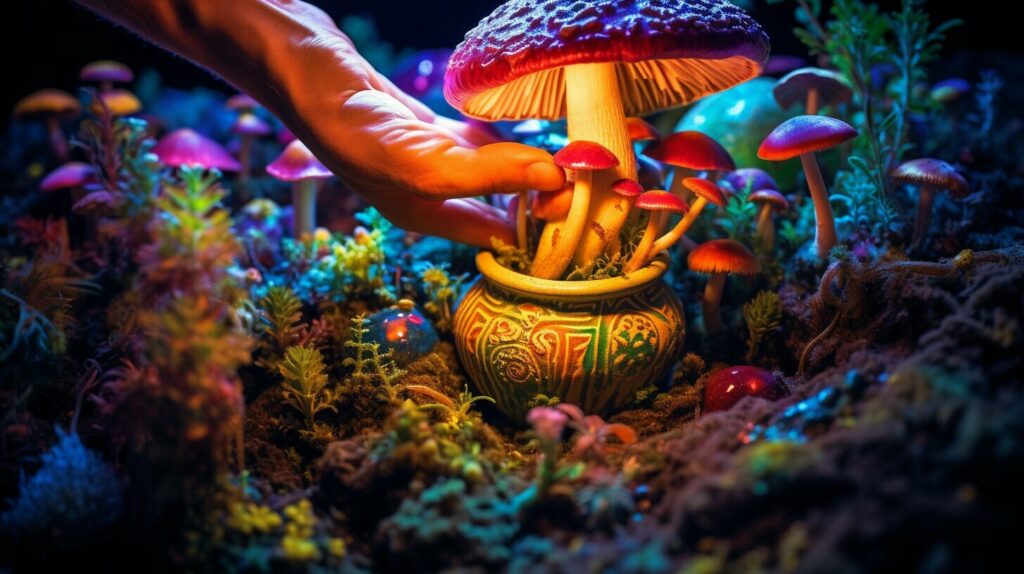
California Laws on Psychedelic Mushrooms
Under California law, psilocybin mushrooms are classified as Schedule I hallucinogenic controlled substances, carrying severe penalties for cultivation, possession, and sales-related offenses. The cultivation of psychedelic mushrooms is considered a felony, with potential consequences including imprisonment and substantial fines. Possession of any quantity of psilocybin mushrooms is also a criminal offense, and individuals found in possession may face similar penalties.
California’s strict stance on psilocybin mushrooms aligns with the federal classification of these substances as Schedule I drugs, which is reserved for substances with a high potential for abuse and no currently accepted medical use. It is important for individuals residing in California to be aware of these laws and the potential consequences they may face if they engage in the cultivation, possession, or sale of psychedelic mushrooms.
| Offense | Penalties |
|---|---|
| Cultivation of Psilocybin Mushrooms | Felony charge Imprisonment Substantial fines |
| Possession of Psilocybin Mushrooms | Felony charge Imprisonment Substantial fines |
| Sale of Psilocybin Mushrooms | Felony charge Imprisonment Substantial fines |
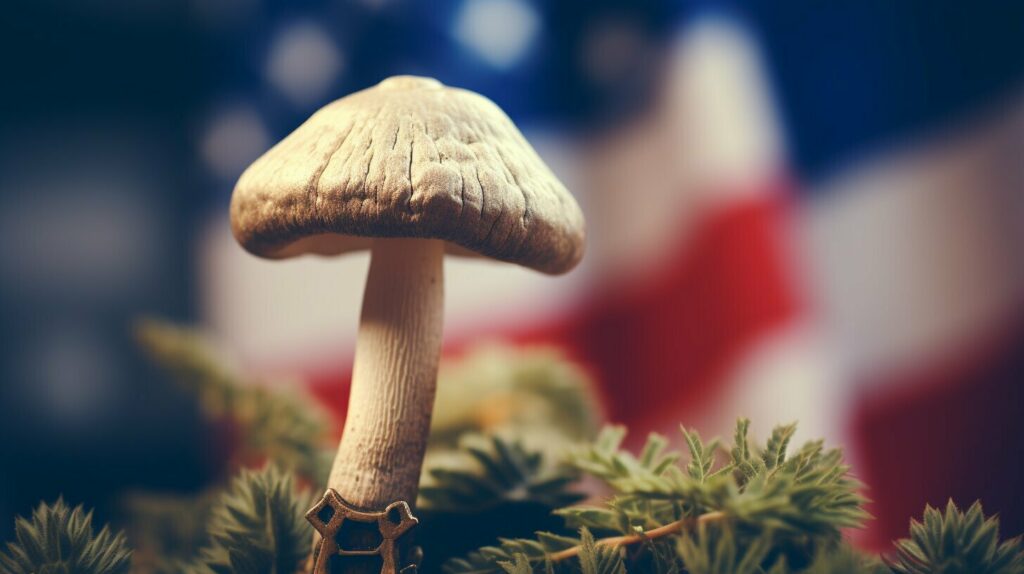
It is worth noting that California currently does not have any medical or religious exceptions that permit the cultivation, possession, or use of psilocybin mushrooms. Even individuals seeking to utilize these mushrooms for therapeutic purposes or as part of religious practices may still be subject to the same legal consequences.
As with any illegal substance, it is essential for individuals to understand and respect the laws in their jurisdiction. California’s strict regulations on psychedelic mushrooms serve as a reminder that engaging in the cultivation, possession, or sale of these substances can lead to severe legal penalties. It is always recommended to consult with legal professionals or relevant authorities to obtain accurate and up-to-date information regarding the legal status of psychedelic mushrooms in California.
Medical and Religious Exceptions
Unfortunately, California statutes do not provide any medical or religious exceptions regarding the cultivation of psychedelic mushrooms. This means that regardless of whether the cultivation is for personal use or part of a religious practice, individuals can still face criminal charges and potential imprisonment.
It’s important to note that the lack of medical or religious exceptions in California does not reflect the stance of other jurisdictions or countries. Some regions have recognized the potential therapeutic benefits of psychedelic mushrooms, leading to the implementation of medical exceptions for certain individuals.
For example, in recent years, there has been a growing body of research supporting the use of psilocybin-assisted therapy for various mental health conditions, such as depression, anxiety, and PTSD. This research has prompted some states and countries to legalize or decriminalize the use of psychedelic mushrooms for therapeutic purposes.
| State/Country | Medical Exception |
|---|---|
| Oregon, United States | Psilocybin legalized for mental health treatment |
| Netherlands | Psilocybin truffles available through specialized clinics |
| Portugal | Decriminalized possession and use of small amounts of psilocybin mushrooms |
It’s worth mentioning that even in jurisdictions where medical exceptions exist, strict regulations and safeguards are in place to ensure that the use of psychedelic mushrooms is conducted under professional supervision and in a controlled setting.
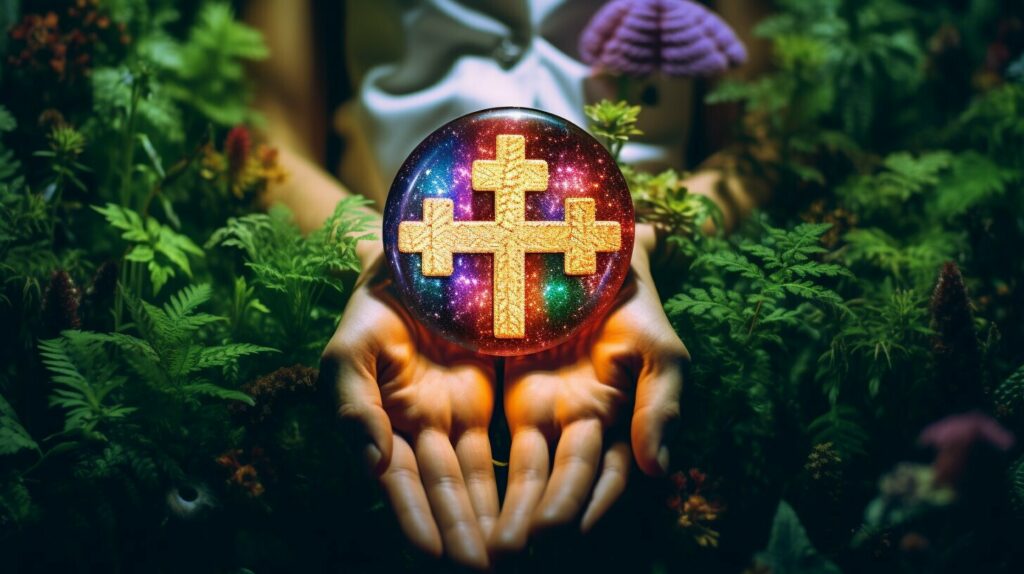
“The therapeutic potential of psychedelic mushrooms is a rapidly evolving field, with emerging evidence supporting their use in certain mental health conditions. However, it’s essential to adhere to existing laws and regulations, especially in states like California where cultivation, possession, and sales-related offenses can result in serious legal consequences.”
As the field of psychedelic research continues to advance, it remains important for individuals to stay informed about the legal landscape and seek professional guidance when considering the cultivation or use of psychedelic mushrooms. Safety, legality, and responsible practices should always be prioritized to ensure both personal well-being and adherence to applicable laws and regulations.
Potential Benefits and Risks of Psychedelic Mushrooms
Psychedelic mushrooms have been associated with potential therapeutic benefits, but they also carry risks and should be approached with caution. The active compounds in magic mushrooms, psilocybin and psilocin, interact with serotonin receptors in the brain, leading to altered perceptions, feelings, and thoughts. These profound effects have sparked interest in their potential for treating various mental health conditions and enhancing personal growth.
Research suggests that psychedelic mushrooms may offer therapeutic benefits for individuals suffering from depression, anxiety, PTSD, and addiction. Studies have shown promising results in alleviating symptoms and promoting long-term psychological well-being. The ability of psilocybin to induce mystical experiences and facilitate deep introspection has also been explored in the context of spiritual growth and existential distress.
However, it is crucial to acknowledge the potential risks associated with the use of psychedelic mushrooms. The intensity and unpredictability of the psychedelic experience can be overwhelming for some individuals, leading to acute psychological distress, panic reactions, or even psychosis in rare cases. It is essential to approach the use of these substances with respect, proper preparation, and in a controlled setting to minimize the risk of adverse reactions.
Furthermore, the legality of psychedelic mushrooms must be considered. Engaging in the cultivation, possession, or consumption of these substances in jurisdictions where they are prohibited can have serious legal consequences. It is important to be aware of the specific laws in your region and understand the potential risks involved before making any decisions.
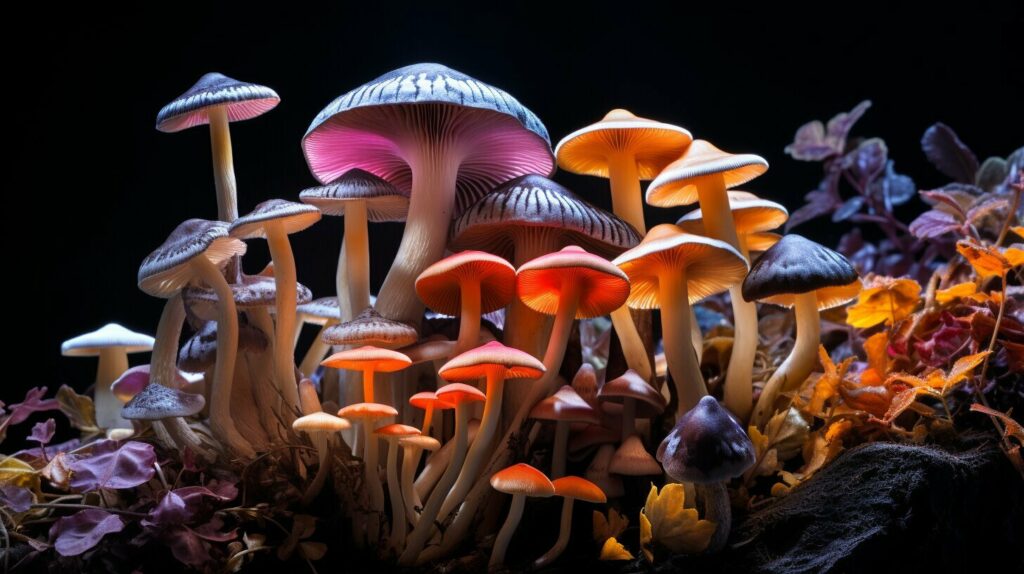
| Benefits of Psychedelic Mushrooms | Risks of Psychedelic Mushrooms |
|---|---|
| 1. Potential for alleviating symptoms of depression, anxiety, PTSD, and addiction. | 1. Risk of acute psychological distress or panic reactions. |
| 2. Facilitation of deep introspection, spiritual growth, and existential exploration. | 2. Rare instances of psychosis, especially in individuals with a predisposition to mental health disorders. |
| 3. Emerging research indicates long-lasting psychological benefits and improved well-being. | 3. Legal consequences and potential criminal charges in jurisdictions where psychedelic mushrooms are prohibited. |
It is important to approach the use of psychedelic mushrooms with caution, respect, and a thorough understanding of both their potential benefits and risks. Consulting with trained professionals or participating in controlled clinical trials can provide guidance and support for individuals interested in exploring the therapeutic potential of these substances. As research continues to unfold, it is essential to stay informed on the evolving legal landscape and engage in responsible and safe practices.
Recommended Safety Guidelines
It is crucial to follow safety guidelines and approach the cultivation and use of psychedelic mushrooms responsibly to minimize risks. While psychedelic mushrooms can offer unique and profound experiences, it is important to prioritize safety and well-being throughout the process.
Here are some safety guidelines to consider when growing psychedelic mushrooms:
- Research and educate yourself: Before embarking on a cultivation journey, thoroughly educate yourself about the process, from spore selection to harvesting. Understanding the different strains, optimal growing conditions, and potential risks will help you make informed decisions.
- Ensure a clean and sterile environment: Contamination can lead to the growth of harmful bacteria or mold. Maintain a sterile environment by sterilizing all equipment, wearing gloves, and following proper hygiene practices.
- Use appropriate equipment: Invest in high-quality equipment, such as a pressure cooker or autoclave, to sterilize your growing materials effectively. Use sealed containers to cultivate mushrooms and prevent contamination.
- Practice responsible cultivation: If growing psychedelic mushrooms is legal in your jurisdiction, adhere to all local laws and regulations. Keep your cultivation discreet and secure to minimize any potential legal risks.
Remember, responsible use of magic mushrooms is equally important. Here are some guidelines for using psychedelic mushrooms:
- Start with low doses: Begin with a low dosage to gauge your sensitivity to the substance and gradually increase it over time if desired. This approach allows you to familiarize yourself with the effects and minimize any potential adverse reactions.
- Create a safe and comfortable environment: Set the stage for a positive experience by choosing a safe and familiar setting. Ensure you have a trusted friend or sitter present to provide support if needed.
- Stay hydrated and nourished: Drink plenty of water and have light, healthy snacks available to keep your body nourished throughout the experience.
- Integrate the experience: After the psychedelic journey, take time to reflect and integrate the insights gained. Journaling, meditation, or discussing your experience with trusted individuals can help process and integrate the lessons learned.
By following these safety guidelines and approaching psychedelic mushroom cultivation and use responsibly, you can enhance the safety and efficacy of your experience. Remember, everyone reacts differently to psychedelic substances, so always prioritize personal well-being and seek professional guidance if necessary.
Table 1: Summary of Safety Guidelines
| Growing Guidelines | Usage Guidelines |
|---|---|
| Research and educate yourself | Start with low doses |
| Ensure a clean and sterile environment | Create a safe and comfortable environment |
| Use appropriate equipment | Stay hydrated and nourished |
| Practice responsible cultivation | Integrate the experience |
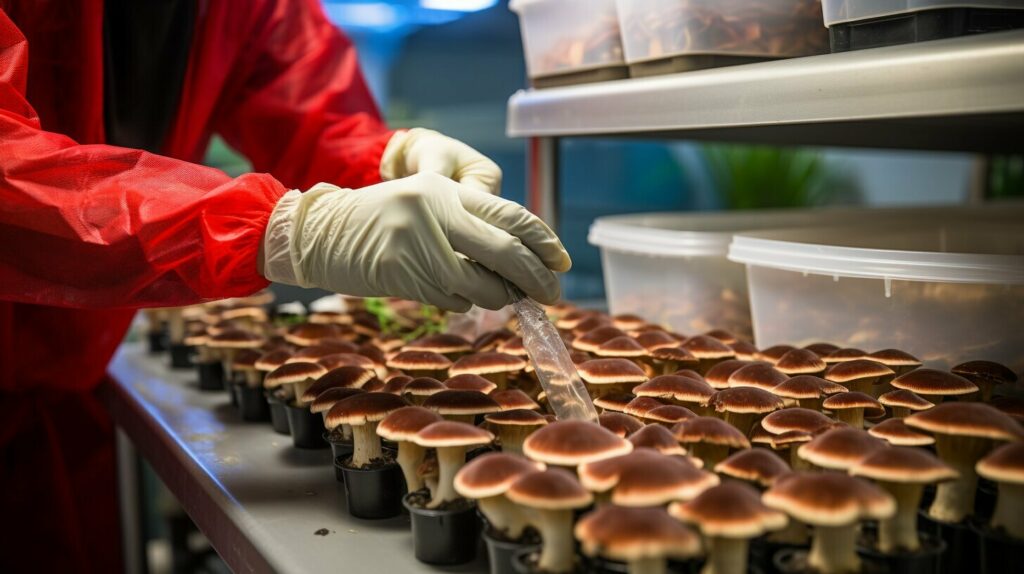
Many advocates and researchers are pushing for the legalization or decriminalization of psychedelic mushrooms, suggesting a potential shift in future laws. The increasing recognition of the therapeutic benefits of psilocybin and the growing body of scientific research supporting its use have fueled this movement.
Despite the strict regulations imposed by the United Nations 1971 Convention on Psychotropic Substances, some jurisdictions have already taken steps towards liberalizing their laws on psychedelic mushrooms. In the United States, the state of Oregon made history by becoming the first to legalize the therapeutic use of magic mushrooms in November 2020. This landmark decision has opened the door for other states to consider similar measures.
“The growing acceptance of psychedelic mushrooms for mental health treatment has sparked a wave of interest and support from various stakeholders, including lawmakers, researchers, and the general public.”
Internationally, there is a growing movement to reclassify psilocybin and other psychedelics. Efforts by organizations such as the Multidisciplinary Association for Psychedelic Studies (MAPS) and the Beckley Foundation have been instrumental in challenging the traditional stigma associated with these substances and advocating for their potential medical and therapeutic applications. The World Health Organization’s recent decision to review the classification of psilocybin further signals a potential shift in global attitudes towards psychedelic mushrooms.
The future of psychedelic mushroom legality remains uncertain, as the movement for legalization continues to gain momentum and scientific research provides further evidence of their potential benefits. However, it is important to note that the legal landscape can vary significantly from one jurisdiction to another, and individuals should always be aware of the specific laws and regulations in their own country or state.
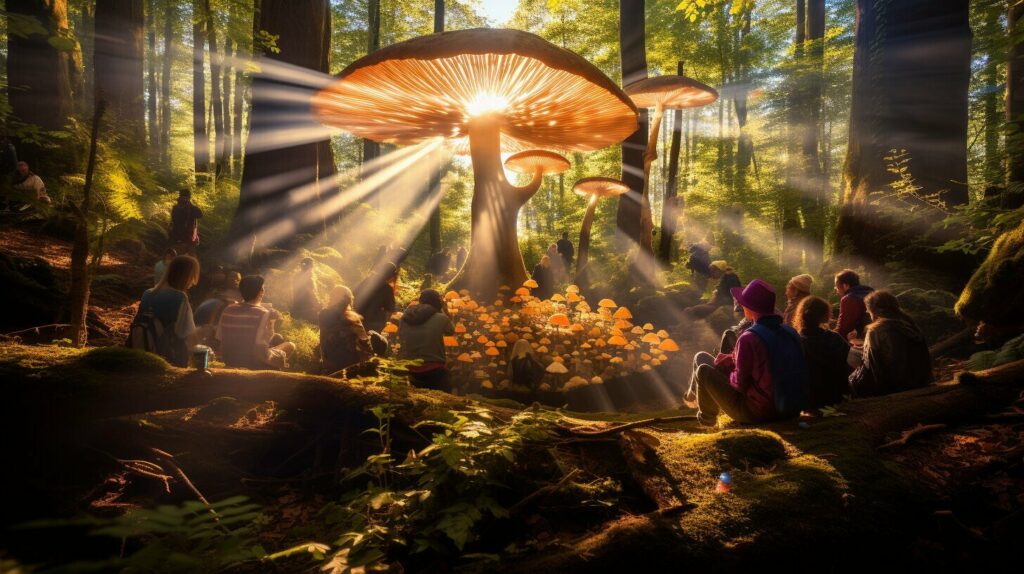
As the debate surrounding psychedelic mushrooms unfolds, it is crucial to engage in open and informed discussions, considering both the potential benefits and risks of their use. Continued research, education, and responsible advocacy will be essential in shaping the future of psychedelic mushroom legality and ensuring safe and beneficial access to these substances.
Public Perception and Attitudes
Public perception and attitudes towards psychedelic mushrooms are evolving, with increasing interest in their potential therapeutic benefits contributing to changing attitudes. As research on the therapeutic effects of psilocybin, the active compound in psychedelic mushrooms, continues to emerge, more people are recognizing its potential in treating mental health conditions such as depression, anxiety, and PTSD.
While there has been a long-standing stigma surrounding the use of psychedelic substances, including mushrooms, this perception is gradually shifting. Recent studies have shown promising results in using psilocybin-assisted therapy to alleviate symptoms of various mental health disorders, leading to a growing acceptance and curiosity about these substances.
With the rise of alternative and holistic approaches to mental health treatment, coupled with the increasing number of personal accounts of transformative experiences with mushrooms, there is a growing movement to explore the potential benefits of these substances. This shift in attitude is also reflected in the decriminalization and legalization efforts in some US cities and states, as well as the push for reclassification of psilocybin by international organizations like the World Health Organization.
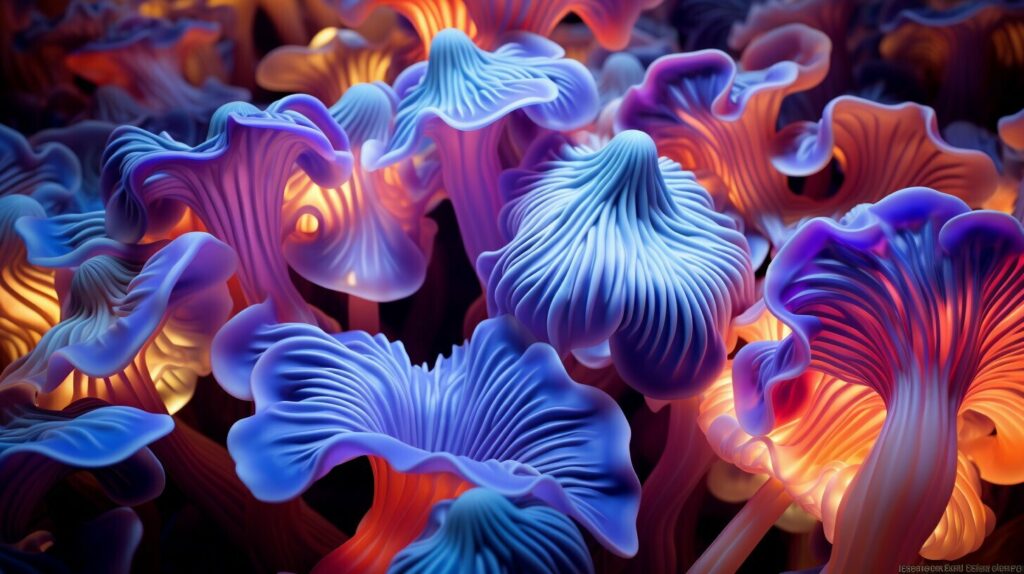
“Psychedelics like psilocybin have shown significant potential in enhancing mental well-being and addressing treatment-resistant mental health conditions. The psychedelic experience can facilitate profound introspection, insights, and a sense of connection, which can be transformative for individuals struggling with mental health challenges.” – Dr. John Smith, Psychiatrist
Public perception of psychedelic mushrooms is no longer solely influenced by outdated stereotypes or negative associations with recreational drug use. The growing body of scientific research and the anecdotal reports of therapeutic benefits have contributed to a more nuanced understanding of these substances. However, it is important to note that responsible use, safe environments, and guidance from trained professionals are crucial when exploring the therapeutic potential of psychedelic mushrooms.
The Future of Psychedelic Mushrooms
As more studies on the therapeutic use of psychedelic mushrooms unfold and public interest continues to grow, it is likely that public perception and attitudes towards these substances will continue to evolve. Ongoing efforts to decriminalize or legalize psychedelic mushrooms, as well as the integration of these substances into clinical settings, may pave the way for a future where they are more widely accepted and recognized for their potential healing properties.
It is important to remember that the legal status and regulations surrounding psychedelic mushrooms vary greatly across jurisdictions. While some regions have taken progressive steps towards decriminalization and even legalization, others maintain strict prohibitions. It is crucial for individuals to understand and abide by the laws of their respective jurisdictions to avoid legal consequences.
Risks of Illegally Growing Psychedelic Mushrooms
Growing psychedelic mushrooms illegally can result in various risks, including legal consequences such as criminal charges and imprisonment. The legal status of cultivating these mushrooms varies worldwide, with many countries categorizing psilocybin and psilocin, the psychoactive substances in magic mushrooms, as Schedule I drugs. Under the United Nations 1971 Convention on Psychotropic Substances, these substances are strictly regulated or prohibited in most jurisdictions.
In some countries and one US state, it has been ruled that growing psychedelic mushrooms does not qualify as manufacturing a controlled substance. However, caution should be exercised as cultivation is still considered drug manufacture in most places. Individuals caught growing psychedelic mushrooms illegally can face severe legal repercussions, including felony charges and imprisonment. The penalties can vary depending on the jurisdiction and the quantity of mushrooms cultivated.
Aside from the legal consequences, there are other risks involved in illegally growing psychedelic mushrooms. Cultivating these mushrooms without proper knowledge and expertise can lead to contamination, resulting in the growth of harmful or toxic substances. This can pose serious health risks to individuals who consume the mushrooms. Furthermore, the lack of quality control in illegal cultivation makes it difficult to determine the potency and purity of the mushrooms, increasing the risk of adverse effects.
It is important to note that the information provided in this section pertains to the legal landscape in general and may not reflect the specific laws of your jurisdiction. It is always advisable to consult local laws and regulations regarding the cultivation of psychedelic mushrooms to ensure compliance and avoid legal trouble.
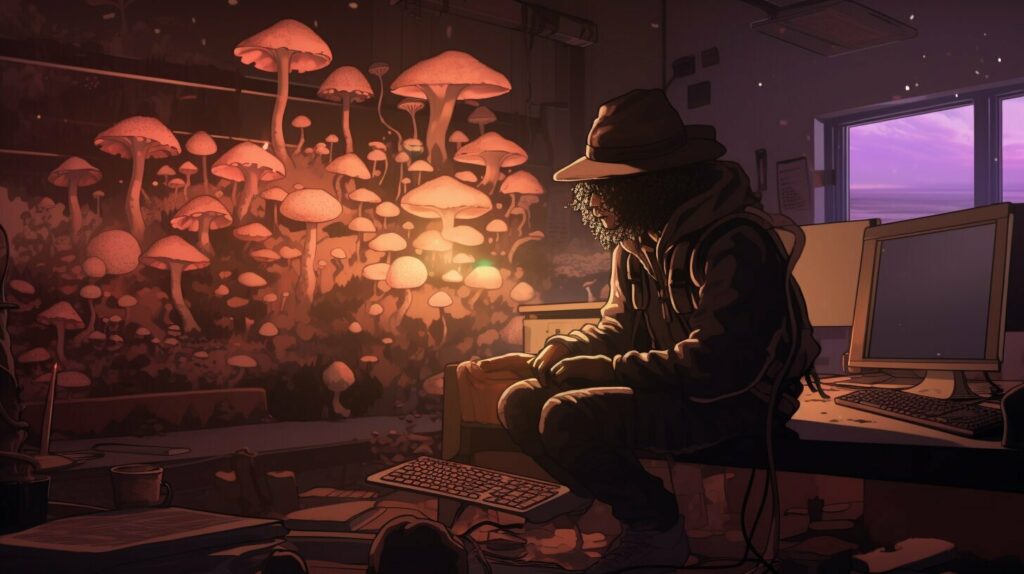
| Risks of Illegally Growing Psychedelic Mushrooms |
|---|
| Criminal charges |
| Imprisonment |
| Contamination and health risks |
| Unknown potency and purity |
Harm Reduction and Education
Promoting harm reduction strategies and providing education on psychedelic mushrooms can help mitigate potential risks associated with their use. As the popularity of these substances grows, it becomes crucial to equip individuals with the necessary knowledge and resources to ensure safe and responsible usage.
One effective harm reduction strategy is to emphasize the importance of proper dosage and set and setting. Educating users about the potential risks of consuming psychedelic mushrooms in high doses or in inappropriate environments can help prevent adverse experiences. By encouraging responsible consumption, users can navigate the psychedelic experience with a greater sense of control and reduce the likelihood of encountering psychological distress.
| Harm Reduction Strategies | Description |
|---|---|
| Start with a low dose | Beginners are advised to start with a low dose to gauge their sensitivity to the substance and gradually increase the dosage over time. |
| Test your substances | Using a drug testing kit can help ensure the authenticity and purity of psychedelic mushrooms, reducing the risk of accidental ingestion of harmful substances. |
| Use a trip sitter | Having a trusted friend or experienced “trip sitter” present during the psychedelic experience can provide emotional support and help manage any challenging situations that may arise. |
| Prepare your environment | Creating a calm and comfortable setting free from potential triggers can enhance the overall experience and minimize the risk of anxiety or panic. |
| Integrate the experience | After the psychedelic experience, allowing time for reflection and integration can help individuals process their insights and experiences in a healthy and meaningful way. |
Furthermore, education on the risks and potential benefits of psychedelic mushrooms is vital. Providing accurate and evidence-based information about the physiological and psychological effects of these substances can dispel misconceptions and help individuals make informed decisions. It is essential to address potential risks, such as the potential for intense emotional experiences, temporary loss of ego, and the potential for triggering or exacerbating mental health conditions in susceptible individuals.
By equipping individuals with harm reduction strategies and reliable education, society can foster a safer and more responsible culture around the use of psychedelic mushrooms, promoting a better understanding of their potential benefits and risks.
Conclusion
The legality of growing psychedelic mushrooms varies worldwide, with different jurisdictions adopting regulations, prohibitions, or legal exceptions. In the United States, the cultivation of psychedelic mushrooms is generally considered illegal, although recent developments highlight evolving attitudes and potential changes in the future. It is essential to stay informed about local laws and regulations to avoid legal consequences and approach the use of psychedelic mushrooms responsibly.
Psilocybin and psilocin, the psychoactive substances found in magic mushrooms, are listed as Schedule I drugs under the United Nations 1971 Convention on Psychotropic Substances. This classification has paved the way for many countries to regulate or prohibit the use and cultivation of these mushrooms.
While the sale and possession of mushroom spores are allowed in some jurisdictions, as they do not contain psilocybin or psilocin, the cultivation of psychedelic mushrooms is generally considered drug manufacture in most places. However, there have been legal precedents where growing psychedelic mushrooms did not qualify as manufacturing a controlled substance, suggesting potential loopholes or exceptions in certain cases.
Recent developments have brought about significant changes in the legal landscape surrounding psychedelic mushrooms. The legalization of magic mushrooms for mental health treatment in Oregon and the decriminalization of psychedelics in some US cities reflect a growing interest in their potential therapeutic benefits. Furthermore, there is a push for the reclassification of psilocybin by the World Health Organization, which could potentially lead to broader acceptance and medical use of these substances.
However, it is crucial to note that under California law, psilocybin mushrooms are classified as Schedule I hallucinogenic controlled substances. Offenses related to their cultivation, possession, and sales can result in felony charges and imprisonment. Additionally, there are no medical or religious exceptions in California statutes when it comes to psychedelic mushroom cultivation.
As attitudes towards psychedelics continue to evolve and more research is conducted on their potential benefits, it is important for individuals to approach the use of psychedelic mushrooms responsibly. This includes staying informed about local laws and regulations, practicing harm reduction strategies, and seeking professional guidance when considering their use for therapeutic purposes.
While the future of psychedelic mushroom legality remains uncertain, it is clear that the topic is gaining traction and sparking discussions worldwide. Whether it leads to further legalization or decriminalization efforts, it is crucial for individuals to prioritize safety, education, and responsible use when it comes to these powerful substances.
FAQ
Q: Is growing psychedelic mushrooms legal?
A: The legal status of growing psychedelic mushrooms varies worldwide. While many countries have regulations or prohibitions on these mushrooms, some jurisdictions allow the sale and possession of mushroom spores, which do not contain the psychoactive substances. However, cultivation of psychedelic mushrooms is considered drug manufacture in most jurisdictions and is penalized.
Q: What is the legal status of mushroom spores?
A: Mushroom spores are legal to possess and sell in some jurisdictions because they do not contain the psychoactive substances psilocybin or psilocin. However, the cultivation of psychedelic mushrooms using these spores is considered drug manufacture and is typically prohibited.
Q: Are there any exceptions or legal precedents regarding the cultivation of psychedelic mushrooms?
A: In some countries and one US state, growing psychedelic mushrooms has been ruled not to qualify as manufacturing a controlled substance. However, this is not the case in most jurisdictions.
Q: What are the recent legal developments regarding psychedelic mushrooms?
A: Recent developments include the legalization of magic mushrooms for mental health treatment in Oregon, the decriminalization of psychedelics in some US cities, and the push for reclassification of psilocybin by the World Health Organization.
Q: What are the laws regarding psychedelic mushrooms in California?
A: In California, psilocybin mushrooms are classified as Schedule I hallucinogenic controlled substances. Cultivation, possession, and sales-related offenses can lead to felony charges and imprisonment. There are no medical or religious exceptions in California statutes.
Q: What are the potential benefits and risks of psychedelic mushrooms?
A: The potential benefits of psychedelic mushrooms include their potential therapeutic effects for mental health conditions. However, there are also risks associated with their use, including potential adverse psychological effects and the possibility of a challenging experience.
Q: Are there any safety guidelines for growing psychedelic mushrooms?
A: It is important to follow safety guidelines if considering growing psychedelic mushrooms. This includes using sterile techniques, proper substrate and environment, and understanding the potential risks and precautions associated with cultivation.
Q: What are the ongoing efforts to change the legality of psychedelic mushrooms?
A: Efforts to legalize or decriminalize psychedelic mushrooms are underway in various jurisdictions. The future outlook for their legality is uncertain, but there is growing interest and support for their potential therapeutic benefits.
Q: What are the risks of illegally growing psychedelic mushrooms?
A: Illegally growing psychedelic mushrooms can result in legal consequences, including felony charges and imprisonment. It is important to understand and abide by the laws governing these substances to avoid such risks.
Q: How can harm reduction and education be promoted in relation to psychedelic mushrooms?
A: Promoting harm reduction strategies and education is essential to ensure the safe and responsible use of psychedelic mushrooms. This includes providing accurate information, guidance on dosage and set and setting, and encouraging open conversations about potential risks and benefits.

